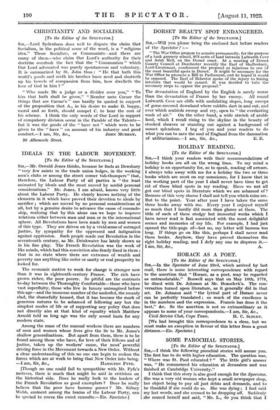IDEALS IN THE LABOUR MOVEMENT.
[To the Editor of the SPECTATOR.]
SIR,—Mr. Oswald Jones thinks, because he finds at Dewsbury " very few saints in the trade union lodges, in the working men's clubs or among the street corner tub thumpers " that, therefore, the Labour Party of all parties is " the least animated by ideals and the most moved by sordid personal considerations." Mr. Jones, I am afraid, knows very little about the Labour Party. He clearly knows nothing of the elements in it which have proved their devotion to ideals by sacrifice ; which are moved by no personal considerations at all, but by a genuine desire to advance the cause of comrade- ship, realizing that by this alone can we hope to improve relations either between man and man or in the international sphere. All Revolutions have been made by men and women of this type. They are driven on by a vivid sense of outraged justice, by sympathy for the oppressed and indignation against oppiession. Such people made our Revolution in the seventeenth century, as Mr. Drinkwater has lately shown us in his fine play. The French Revolution was the work of like minds, which had this conviction also firmly fixed in them : that in no state where there are extremes of wealth and poverty can anything like order or sanity or real prosperity be looked for.
The economic motive to work for change is stronger now than it was in eighteenth-century France. The rich have grown richer, the poor poorer. So pitiful are the contrasts to-day between the Thoroughly Comfortable—those who have vast superfluity, those who live in luxury unimagined before this age—and the immense number of the underfed, the meanly clad, the shamefully housed, that it has become the mark of generous natures to be ashamed of following any but the simplest modes of life or of supporting any policy that does not directly aim at that kind of equality which Matthew Arnold told us long ago was the only sound basis for any modern state.
Among the mass of the manual workers there are numbers of men and women whose lives give the lie to Mr. Jones's shallow generalizations. But apart from them, there is to be found among those who have, for love of their fellows and of justice, taken up the workers' cause, the most powerful driving force in the Movement towards a New Order. Without a clear understanding of this no one can begin to reckon the forces which are at work to bring that New Order into being.
[Though no one could fail to sympathize with Mr. Fyfe's motives, there is much that might be said in criticism on the historical side. Does he really look to the leaders of the French Revolution as good exemplars ? Does he really believe that the poor have become poorer ? Mr. Sidney Webb, eminent among the brains of the Labour Party, can be quoted to prove the exact onposite.—En. Spectator.]


































 Previous page
Previous page